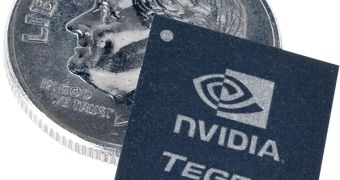The first mobile phones powered by Nvidia's Tegra solution are out in the wild, and it seems that the chip maker has great plans for mobile space with the next generation of its solution. According to Nvidia, while its main focus with the first-gen Tegra was on Microsoft Zune and Microsoft Win Mobile, the plan is to expand its reach with the second generation, and expects for the chip to power Android-based devices before the end of the ongoing year. Jen-Hsun Huang, co-founder, chief executive officer, president and director of Nvidia, is the one to unveil such plans, during the company's Q1 fiscal 2011 earnings call.
“On the second generation, we were able to expand to focus a lot of our energy around Android. And although it made sense for the first-generation Androids to use available phone processors, the follow-on generations of Android are really going to go after performance,” is what Huang stated, according to the NVIDIA Q1 2011 Earnings Call Transcript, available here.
Nvidia made the first steps into the smartphone market, and handsets that pack Tegra inside are available from Microsoft at the moment, but the company does not plan on stopping here. The chip maker says that there are multiple next-gen Tegra designs in smartphones and tablets expected to be announced later during the ongoing year, and that its solution should offer performance in areas like multimedia, high resolution displays, and the like. The company will face great competition from chip makers like Qualcomm and TI, but its aim is somewhere else, it seems.
“And iPhones are out there, the iPhone 4G is coming, the iPad is obviously a revolutionary product. The bar is pretty high for all of the mobile players, and so they need a processor that can keep up with the A4. If not, be much better than what the A4 can do because they have to take on the leader in the space. And so I think the second-generation Tegra has been doing incredibly well because Android is doing incredibly well. So we're going to come to market with the second-generation Tegra with the third-generation Android,” Huang concluded.

 14 DAY TRIAL //
14 DAY TRIAL //